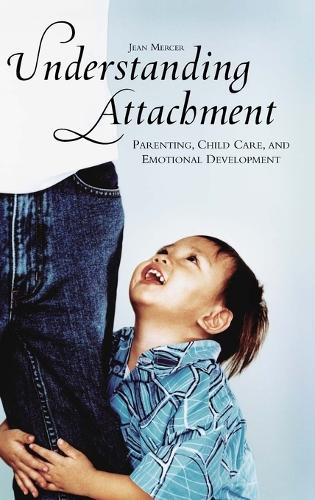
Understanding Attachment: Parenting, Child Care, and Emotional Development
(Hardback)
Publishing Details
Understanding Attachment: Parenting, Child Care, and Emotional Development
By (Author) Jean Mercer
Bloomsbury Publishing PLC
Praeger Publishers Inc
30th November 2005
United States
Classifications
General
Non Fiction
Child, developmental and lifespan psychology
649.1
Physical Properties
Hardback
208
Width 156mm, Height 235mm
482g
Description
Is maternal instinct fact or fiction What special challenges do adoptive parents face What kind of daycare is better, one with many caregivers or one with few When is separation anxiety normal in a child Do the experiences of early childhood always influence our ability to build and maintain social relationships as adults Understanding Attachment helps to answer these questions and many others. This book is perfect for the reader who wants or needs a thorough understanding of attachment, but does not have time to indulge in lengthy study. Parents, child care providers, teachers, nurses, social workers, attorneys, therapists, students, and counselors will all appreciate this work.
Is maternal instinct fact or a myth What special challenges do adoptive parents face What kind of daycare is better, one with many caregivers or one with few When is separation anxiety normal in a child, and when is it a sign of a developmental problem Do the experiences of early childhood always influence our ability to build and maintain social relationships as adults Understanding Attachment helps to answer these questions and many others. This book is perfect for the reader who wants or needs a thorough understanding of attachment, but does not have the time to indulge in lengthy study. Parents, child care providers, teachers, nurses, social workers, attorneys, therapists, students, and counselors will all appreciate this work.
Mercer defines attachment and related terms, discusses the history of the idea, and describes ways in which this aspect of emotional life can be measured. She explains developmental change and the way attachment continues to alter from infancy to adulthood. The importance of social experiences with parents and other caregivers is emphasized. Outcomes of good and poor attachment experiences are discussed, and there is material on attachment disorders. The book concludes with a description of recent work that gives a new perspective on attachment.
Reviews
A useful companion to Mercer's Attachment Therapy on Trial, written with Larry Sarner and Linda Rosa with Gerard Costa (CH, Dec'03, 41-2488), this book will be especially valuable for those unfamiliar with attachment theory and research. Mercer provides a concise and jargon-free summary of attachment theory and successfully reveals how developments in the assessment of attachment promoted the evolution of attachment theory to what it is today.Recommended. Lower-/upper-division undergraduates; technical students; practitioners; general readers. * Choice *
Secure attachments are a matter of both nature and nurture, the individual and the environment. Some of the most nurturing parents in the world will have insecure children, and some secure children will survive the most erratic and troubled parents. That said, Mercer's recommendations for creating attachment-friendly daycare practices and interventions, based on the child's changing developmental needs, are sensible. Attachment, like grass, will emerge through even the tiniest of cracks. Whether we then water those tendrils or trample on them is our choice. * Times Literary Supplement (London) *
Author Bio
Jean Mercer is Professor of Psychology in the Division of Social and Behavioral Sciences at Richard Stockton College and President of the New Jersey Association for Infant Mental Health. She is also co-author of Attachment Therapy On Trial (Praeger, 2003).
